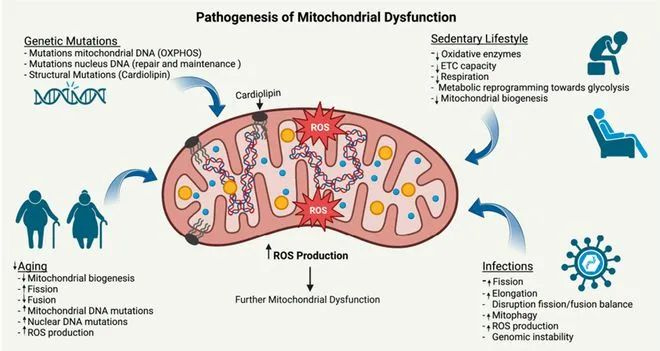In the field of biology, Denham Harman, a pioneer in the study of free radicals, proposed the theory of mitochondrial aging as early as 1972.
Aging is determined by the rate of free radical leakage in mitochondria and the cell's innate ability to protect and repair damage, Hamann said.
As we age, the number and quality of mitochondria in our bodies continue to decline, and the health of mitochondria plays a decisive role in the overall health of organisms, in this process, NAD+ plays a crucial role.
The expression of mitochondrial aging
1. Mitochondrial decline
As we age, the number of mitochondria in our cells gradually decreases.
The muscle cells of an elderly individual, for example, may have only about half as many mitochondria as those of a young individual.
When the number of mitochondria falls, the contractile function of cells with high energy requirements, such as cardiomyocytes, becomes weaker. After all, the continuous contraction of the heart muscle requires a large amount of adenosine triphosphate (ATP) for energy.
2. Mitochondrial mass decline
The mitochondrial respiratory chain is a key structure for the production of ATP, and complexes in the respiratory chain (such as complexes I, II, III, IV) are highly likely to have structural and functional abnormalities during aging.
When electron transport is blocked, protons (H +) are not efficiently pumped out of the mitochondrial membrane Spaces, making it difficult for electrochemical gradients to form effectively and ultimately leading to a decline in mitochondrial mass.
When mitochondrial function is impaired, a variety of diseases such as mitochondrial myopathy, heart failure, and neurodegenerative diseases can ensue.

NAD+ retards mitochondrial aging
1. Power the mitochondria
NAD+ plays a key role in cellular energy metabolism. It is an essential coenzyme in the tricarboxylic acid cycle in mitochondria and is involved in converting various nutrients into a form of energy that cells can use - adenosine triphosphate (ATP).
Adequate levels of NAD+ ensure that mitochondria produce energy efficiently, thus maintaining normal physiological functions of cells.
2. Maintain mitochondrial function stability
Participating in electron transport
NAD+ plays the role of electron acceptor and donor and participates in the electron transfer process of the mitochondrial respiratory chain, which plays an important role in the production of ATP and the maintenance of cell REDOX balance.
Regulation of mitochondrial autophagy
The right level of NAD+ helps to promote mitochondrial autophagy, which causes the body to clear away damaged mitochondria, thereby maintaining the health and normal function of the mitochondrial population.
3. Delay cell senescence
With the increase of age, the level of NAD+ in the body will gradually decrease, which will lead to the decline of mitochondrial function.
Abnormal mitochondrial function is closely related to aging and many age-related diseases.
By increasing the level of NAD+ in the body, it may be able to play an active role in improving mitochondrial function, thereby delaying the process of cellular aging.
How to effectively supplement NAD+
1. Regular motion
Appropriate amount of aerobic exercise, such as walking, swimming, etc., such exercise can effectively improve heart and lung function, promote blood circulation, to a certain extent, increase the content of NAD+ in the body, and improve mitochondrial function is quite beneficial.
2. Balanced diet
Increasing the intake of fresh fruits and vegetables rich in NAD+ precursor molecules helps to increase the content of NAD+ in the body, and at the same time can reduce the damage caused by free radicals to mitochondria, play a role in protecting mitochondrial membrane and DNA, and thus maintain the normal function of mitochondria.
3. Improve the NAD+ level
It is also possible to increase NAD+ levels with nutritional supplements.
For example, as a precursor of NAD+, supplementing NMN can improve the level of intracellular NAD+, strengthen the function of mitochondria, improve energy metabolism, and play a role in protecting and repairing mitochondria.
Of course, direct exogenous supplementation of NAD+ is one of the most effective ways to improve mitochondrial function, with higher absorption rate and faster effect.
conclusion
Aging is often accompanied by a loss of mitochondrial homeostasis and a decrease in NAD+ levels.
By supplementing NAD+ nutrients to enhance body metabolism, help maintain the stability of mitochondrial function, achieve the effect of delaying aging, and can effectively prevent a variety of diseases such as neurodegenerative diseases, metabolic diseases and cardiovascular diseases.
Among the many ways to supplement NAD+, direct exogenous drip supplement of NAD+ shows obvious advantages and is one of the most effective supplement methods.






